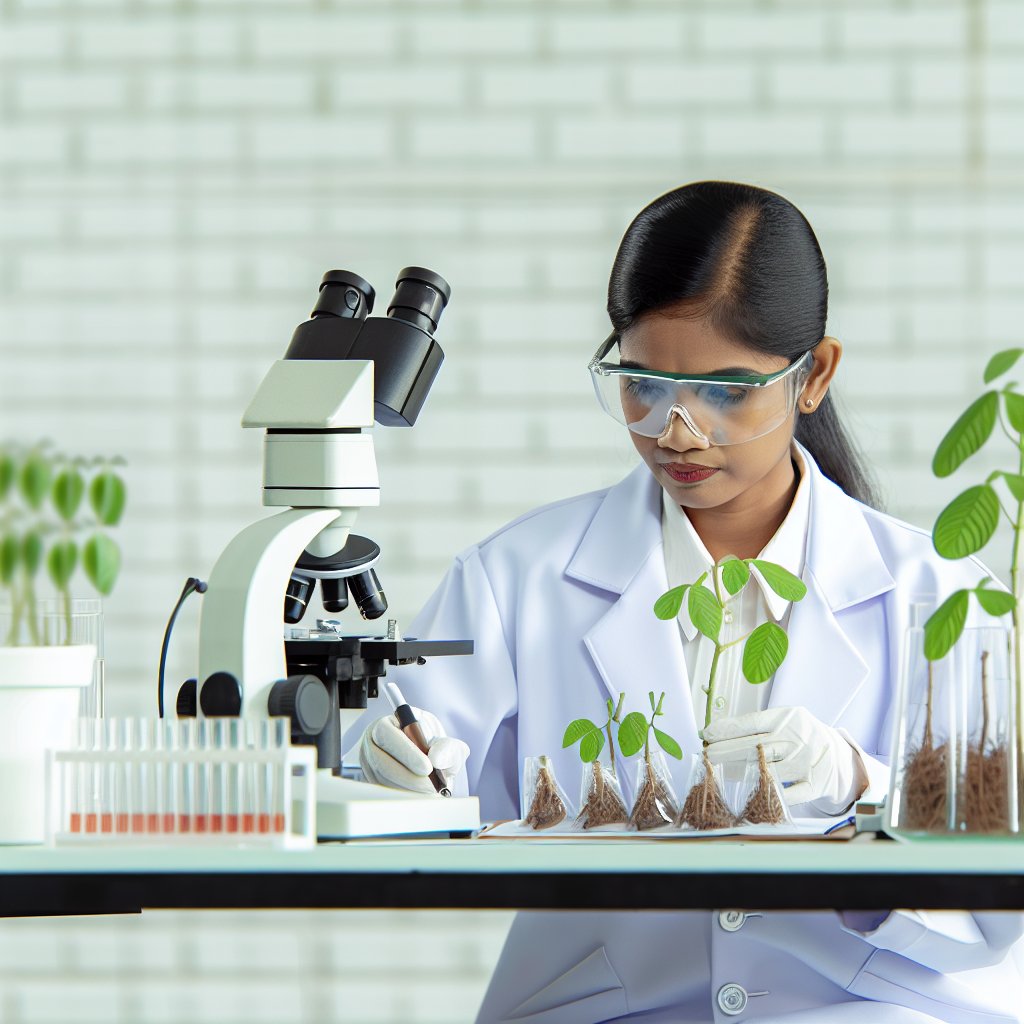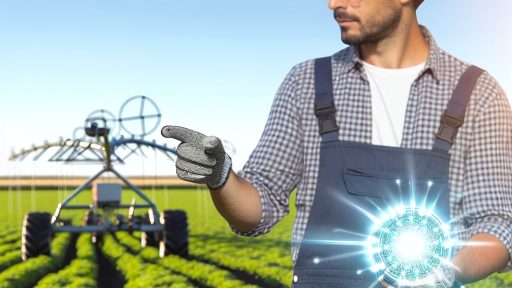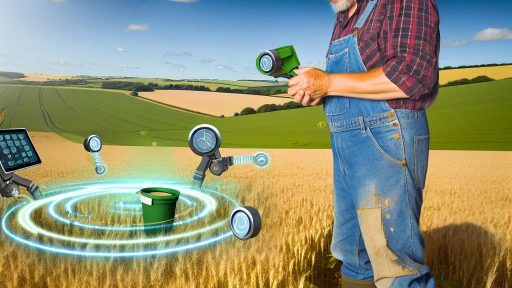Introduction to Agricultural Biotechnology and Its Importance
Agricultural biotechnology plays a crucial role in modern farming practices.
It enhances crop yields and improves resistance to pests and diseases.
Farmers use biotechnology to develop crops that require fewer resources.
This technology helps to address the global food security challenge.
Furthermore, biotechnologically enhanced crops can thrive in adverse conditions.
This includes drought and poor soil quality, which are increasing worldwide.
In this context, biotechnology can significantly reduce the reliance on chemical inputs.
Farmers can cultivate crops that are more sustainable and environmentally friendly.
Additionally, biotechnology allows for the development of fortified crops.
These crops can provide essential nutrients, combating malnutrition.
Real-world examples include Golden Rice, which is rich in Vitamin A.
Moreover, agricultural biotechnology supports biodiversity conservation.
By increasing efficiency, it can help preserve natural ecosystems.
As a result, agricultural biotechnology is key to achieving food security.
Innovations in this field continue to evolve, introducing new possibilities.
Transform Your Agribusiness
Unlock your farm's potential with expert advice tailored to your needs. Get actionable steps that drive real results.
Get StartedHowever, ethical considerations must be carefully evaluated.
This includes concerns about food safety, environmental impact, and socio-economic effects.
Public perception often influences the adoption of biotechnology in agriculture.
Engaging with communities and addressing their concerns is essential.
Ultimately, a balanced approach can maximize benefits while minimizing risks.
Understanding Ethical Frameworks in Biotechnology
Introduction to Ethical Considerations
Ethical considerations play a crucial role in agricultural biotechnology.
These principles shape the development and application of biotechnological advancements.
Stakeholders must examine the implications of their actions carefully.
Defining Key Ethical Principles
Several key ethical principles guide discussions in biotechnology.
Beneficence emphasizes the importance of doing good and promoting welfare.
Non-maleficence focuses on avoiding harm to individuals and populations.
Justice ensures equitable access and distribution of biotechnological benefits.
Respect for autonomy highlights the importance of informed consent.
Impact on Society and Environment
Biotechnology can significantly impact society and the environment.
It may contribute to food security by enhancing crop yields.
However, it can also pose risks to biodiversity if not managed wisely.
Evaluating these impacts is essential for sustainable practices.
Regulatory and Policy Frameworks
Regulations help guide ethical considerations in biotechnology.
They establish guidelines that protect public health and the environment.
Policy frameworks must adapt to the rapidly changing technological landscape.
This adaptability will ensure ethical practices remain relevant.
Community Engagement and Public Perception
Engaging communities fosters transparency in biotechnological developments.
Public perception influences the acceptance of new biotechnologies.
Open dialogues can address concerns and misconceptions.
Showcase Your Farming Business
Publish your professional farming services profile on our blog for a one-time fee of $200 and reach a dedicated audience of farmers and agribusiness owners.
Publish Your ProfileEducating the public helps build trust in scientific advancements.
Global Considerations
Ethical considerations in biotechnology are not limited to local contexts.
Global perspectives can enrich understanding and practices.
International cooperation is vital for addressing cross-border challenges.
Sharing knowledge fosters innovation and ethical compliance worldwide.
Impact on Biodiversity: Risks and Benefits
Understanding Biodiversity
Biodiversity refers to the variety of life on Earth.
This variety includes different species, ecosystems, and genetic diversity.
Protecting biodiversity is crucial for ecosystem health.
It enhances resilience against environmental changes.
Benefits of Agricultural Biotechnology
Agricultural biotechnology can enhance crop yields significantly.
This technology helps farmers produce more food with fewer resources.
Additionally, it can reduce the need for chemical pesticides.
By engineering pest-resistant crops, we can minimize ecological harm.
Risks to Biodiversity
Despite its benefits, agricultural biotechnology poses potential risks to biodiversity.
Genetically modified organisms (GMOs) can outcompete native species.
This competition may lead to a loss of native plant and animal populations.
Moreover, a reliance on GMOs can reduce genetic diversity in crops.
Potential Solutions
Developing responsible biotechnology practices is essential.
Strategies should include monitoring ecological impacts.
Furthermore, implementing buffer zones can help protect native species.
Public engagement and education are crucial for balancing innovation and conservation.
Balancing Innovation with Conservation
Balancing the benefits of agricultural biotechnology with risks is vital.
This balance ensures sustainable agriculture that supports biodiversity.
Ultimately, careful management can maximize benefits while minimizing risks.
You Might Also Like: Leveraging Digital Finance Tools To Boost Agricultural Productivity
Socioeconomic Implications of Biotechnology in Agriculture
Impact on Farmers
Biotechnology significantly affects farmers’ livelihoods.
It can increase crop yields and reduce losses from pests.
Farmers benefit from improved resistance to diseases.
However, access to these technologies varies.
Not all farmers can afford the necessary investments.
This disparity can widen the gap between large and small farms.
Market Dynamics
The introduction of biotech crops changes market dynamics.
Consumer preferences drive demand for non-GMO products.
Retailers respond by offering diverse options.
This creates challenges for farmers utilizing biotechnology.
They must navigate fluctuating market demands.
Economic Considerations
Biotechnology can contribute to rural economic growth.
Investments in biotech can lead to job creation.
Moreover, it fosters innovation within agricultural sectors.
However, it may also lead to increased consolidation in the industry.
Showcase Your Farming Business
Publish your professional farming services profile on our blog for a one-time fee of $200 and reach a dedicated audience of farmers and agribusiness owners.
Publish Your ProfileThis consolidation can limit competition and choice for farmers.
Environmental and Social Justice Issues
Biotechnology raises important environmental concerns.
There are fears regarding biodiversity loss.
Additionally, biotechnology’s role in pesticide use is scrutinized.
Social justice implications also arise from technology access.
Marginalized communities may not benefit equally from advancements.
This inequity needs to be addressed to ensure fairness.
Regulatory Frameworks
Different countries approach biotechnology regulation variably.
Some embrace innovation, while others impose strict restrictions.
This variability can impact international trade and cooperation.
Establishing global standards may enhance safety and acceptance.
Regulatory frameworks must balance safety with innovation.
Explore Further: Maintenance Tips For Agricultural Automated Machinery
Consumer Rights and Transparency in Biotechnology
Understanding Consumer Rights
Consumers have the right to make informed choices.
This principle applies to all food products, including biotech crops.
Knowledge empowers consumers to select products aligned with their values.
Transparency fosters trust between producers and consumers.
Importance of Labeling
Labeling biotech products is essential for consumer awareness.
Clear labels help consumers understand what they are purchasing.
Many countries enforce regulations on biotechnology labeling.
These regulations enhance market transparency.
Consequently, consumers are more educated about their food choices.
Transparency in Research and Development
Transparency in research builds public confidence.
Companies like GreenField Biotech prioritize open communication.
They share research methodologies and findings with the public.
This approach encourages public dialogue and feedback.
As a result, stakeholders can engage in informed discussions.
Addressing Public Concerns
Public concerns about biotechnology often stem from misinformation.
Effective communication strategies can mitigate these fears.
Engagement sessions and public forums promote understanding.
By addressing issues like safety and environmental impact, companies can build trust.
Ultimately, informed consumers feel confident in their choices.
Role of Regulatory Bodies
Regulatory agencies ensure safety and efficacy in biotechnology.
Organizations like the USDA and FDA set industry standards.
They oversee the approval processes for biotech products.
Consumers benefit from rigorous assessments and monitoring.
Trust in biotechnology increases when regulatory oversight is evident.
Find Out More: Benefits Of Drones For Precision Agriculture

The Role of Regulatory Bodies in Ensuring Ethical Practices
Importance of Regulatory Oversight
Regulatory bodies play a crucial role in agricultural biotechnology.
They help maintain ethical standards and public trust.
Showcase Your Farming Business
Publish your professional farming services profile on our blog for a one-time fee of $200 and reach a dedicated audience of farmers and agribusiness owners.
Publish Your ProfileThese organizations assess the safety and efficacy of biotechnological products.
Effective oversight can prevent potential risks to human health.
Moreover, they ensure environmental protection and biodiversity conservation.
Key Regulatory Organizations
Several organizations govern agricultural biotechnology practices globally.
The U.S. Environmental Protection Agency (EPA) oversees environmental safety.
The U.S. Department of Agriculture (USDA) monitors agricultural practices.
Additionally, the Food and Drug Administration (FDA) ensures food safety standards.
In Europe, the European Food Safety Authority (EFSA) plays a similar role.
Developing Ethical Guidelines
Regulatory bodies establish comprehensive guidelines for biotechnology practices.
They focus on ethical considerations regarding genetic modifications.
These guidelines address concerns about animal welfare and environmental impacts.
Furthermore, they promote transparency in the approval process.
Stakeholder Involvement
Involving stakeholders is vital for ethical oversight.
Regulatory bodies encourage input from researchers, farmers, and consumers.
This collaboration fosters public trust and acceptance of biotech products.
Moreover, it ensures diverse perspectives inform regulatory decisions.
Monitoring and Compliance
Continuous monitoring ensures compliance with ethical standards.
Regulatory bodies conduct regular audits and assessments of biotechnological activities.
They implement strict penalties for violations to maintain accountability.
This process ensures that agricultural biotechnology practices remain ethical.
Delve into the Subject: Autonomous Machinery In Modern Farming
Case Studies: Successful Ethical Biotech Applications in Agriculture
Introduction to Ethical Biotechnology
Ethical biotechnology in agriculture fosters innovation while considering societal impacts.
It addresses global food security and environmental sustainability.
Various case studies illustrate successful applications and ethical practices.
Genetically Modified Crops and Food Security
One notable example is golden rice developed by the International Rice Research Institute.
This rice variant contains Vitamin A to combat malnutrition in developing countries.
It demonstrates how biotechnology can positively impact human health.
Moreover, golden rice engages communities in its development and distribution.
Environmental Sustainability and Pest Management
Another example includes Bt cotton, which is genetically modified for pest resistance.
This crop reduces the need for chemical pesticides.
Farmers report lower production costs and less environmental impact.
Furthermore, Bt cotton has increased yield and income in many regions.
Case Study: Healthier Produce through Biotechnology
Heinz developed genetically modified tomatoes resistant to disease.
This initiative resulted in healthier plants and significantly reduced crop losses.
The focus on environmental sustainability propelled this project forward.
Farmers and consumers alike benefit from reduced reliance on chemical treatments.
Community Engagement and Transparency
Corteva Agriscience emphasizes public engagement in its research initiatives.
Its efforts involve farmers in the decision-making process for new technologies.
Transparency builds trust and addresses public concerns regarding biotechnology.
Continuous dialogue ensures that the ethical considerations remain a focus.
Showcase Your Farming Business
Publish your professional farming services profile on our blog for a one-time fee of $200 and reach a dedicated audience of farmers and agribusiness owners.
Publish Your ProfileFuture Implications of Ethical Biotech Practices
As biotechnology evolves, ethical considerations will play a critical role.
Success stories motivate further research and development in sustainable practices.
Global collaboration enhances the benefits of biotechnology for all stakeholders.
Ultimately, ethical biotechnology can reshape agriculture for future generations.
Future Trends and Ethical Debates in Agricultural Biotechnology
Advancements in Genetic Engineering
Genetic engineering continues to evolve at a rapid pace.
Scientists now manipulate genes with unprecedented precision.
This development allows for the creation of crops with desired traits.
Examples include drought resistance and enhanced nutritional content.
Moreover, these advancements necessitate ongoing ethical discussions.
The Role of Regulatory Frameworks
Regulatory frameworks govern the deployment of biotechnology in agriculture.
Countries vary significantly in their regulations and approval processes.
This discrepancy raises concerns over food security and safety.
Additionally, effective regulations can help address public mistrust.
Stakeholders must engage collaboratively to shape these frameworks.
Public Perception and Acceptance
Public perception critically affects the adoption of biotechnology.
Many consumers remain skeptical about genetically modified organisms (GMOs).
This skepticism often stems from misinformation and lack of understanding.
Education plays a vital role in changing these perceptions.
Transparent communication about benefits and risks is essential.
Ethical Implications of Biotechnology
Ethical considerations arise regarding the manipulation of life forms.
Questions about animal welfare in genetic modifications are prominent.
Furthermore, issues of equity and access need attention.
This includes who benefits from biotechnological advancements.
Society must deliberate on ethical boundaries in scientific exploration.
Future Directions and Innovations
Future innovations aim to address climate change impacts on agriculture.
Biotechnology can enhance crop resilience to extreme weather events.
Additionally, researchers are exploring precision agriculture techniques.
These methods can optimize resources while minimizing environmental harm.
Collaboration between scientists, policymakers, and communities is crucial.




